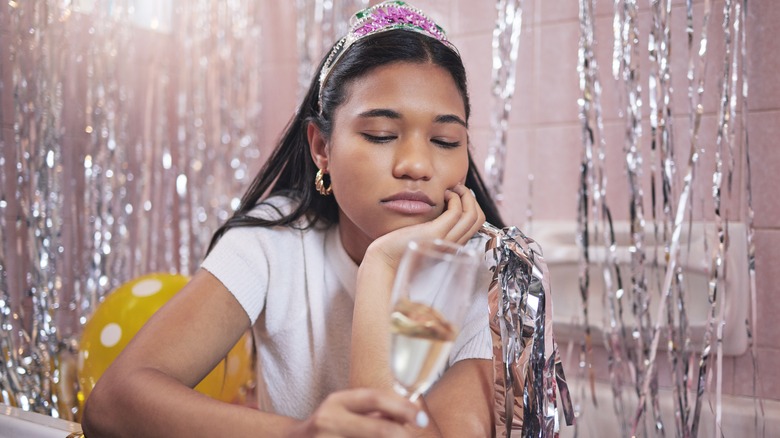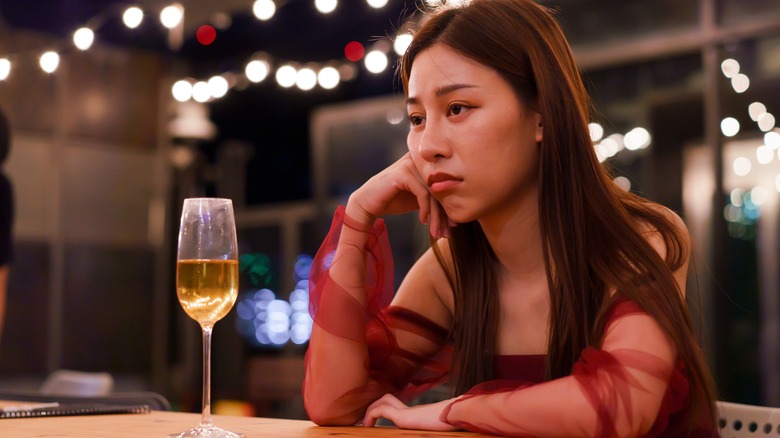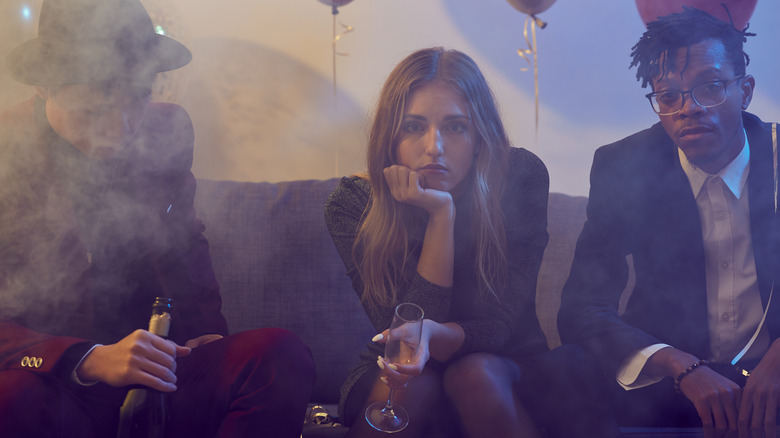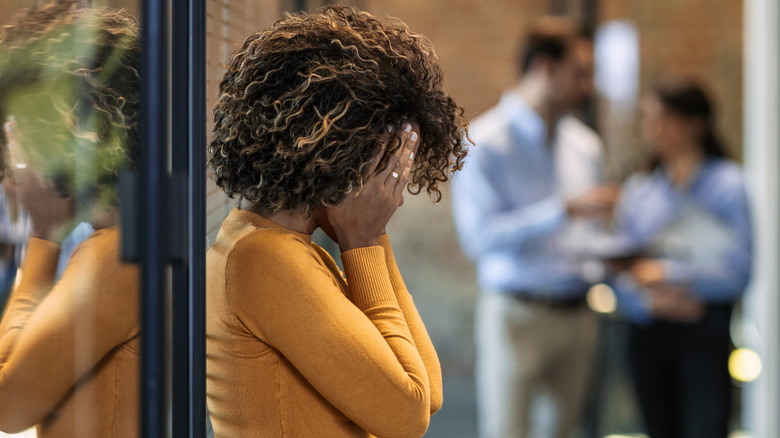Neuropsychologist Tells Us Why Having Anxiety During Life's Big, Happy Moments Is Totally Normal
Although not every type of anxiety is considered a disorder that warrants a doctor visit, anxiousness can still cause tremendous stress in a person's life. This is especially the case when it pops up during moments that don't make sense, like a fun birthday dinner or after winning an award. We're supposed to be happy about these things, right? "Anxiety can be a bit tricky, as it's a primitive response that's hard-wired into the brain," clinical psychologist Carla Marie Manly told HuffPost. "The brain's fear circuit works very quickly, and it doesn't always pause to differentiate between good anxiety and bad."
Unexpected jitters are never fun, but the truth is this type of 'happy' anxiety is actually quite normal. "Anxiety is often associated with negative situations or stressors, but it can also be triggered by positive or happy events," neuropsychologist Dr. Aldrich Chan exclusively tells Women News. "This phenomenon is sometimes referred to as 'positive anxiety' or 'celebratory anxiety.'" According to Dr. Chan, there's no one reason someone might experience this type of anxiety and it can involve anything from social stresses to fear, overstimulation, or past experiences. It may not feel good and it may be confusing, but as Manly points out, anxiety is tricky and unpredictable, so it's important to have an understanding of how and why it happens.
Overstimulation plays a role
So there you are living your best life with all your dreams (finally!) realized. You're surrounded by friends and family. You should be feeling celebratory, lucky, and enthusiastic, right? Right. Instead of all those good feelings, you feel agitated, anxious, and maybe even angry. But why? "Celebratory events can be overwhelming with sensory input, such as loud music, crowds, and excitement," neuropsychologist Dr. Aldrich Chan exclusively tells Women News. "Overstimulation can trigger anxiety in some individuals, even when the event is enjoyable."
Although we don't realize it, the stress in our mind and body from that overstimulation can intensify. It can strengthen and feed off of itself, getting you ready to respond and take action. As things build inside you, your "fight-or-flight response prepares you for emergency situations by increasing your heart rate, widening your airways, and pumping blood to your major muscle groups," licensed psychologist Lienna Wilson, PsyD tells Well + Good. When this happens, the anxiety becomes an inevitable part of the equation. You may be jittery and feel nervous as you became acutely aware to your surroundings. Before you know it, you're in a sea of anxiety looking for a lifejacket that does't exist.
Fear of the future can take you out of the moment
Anxiety and fear tend to go hand-in-hand. Even if you can't pinpoint why you're afraid and can rationally tell yourself there's nothing to fear, it's likely anxiety is the culprit. "Positive events are often associated with happiness, and there may be a fear of not living up to one's own or others' expectations," neuropsychologist Dr. Aldrich Chan says in an exclusive chat with Women News. Along the same vein is being too afraid to see past the celebration that's supposed to be happy. What if this is the highlight of your life and it's all downhill from here? Of course, it's not, but it's not uncommon to think these sorts of things when anxiety is at the helm. "Some people may worry about the event ending and returning to their usual routine, which can lead to feelings of anxiety during the event," said Dr. Chan.
It also comes down to fear of the unknown. What's going to happen after the event? Will things be different? Or the same? It's natural to feel this way, especially if the celebratory moment is the beginning of something else like a new job or a wedding. "Most of us like stability and predictability," licensed psychologist Lienna Wilson, PsyD tells Well + Good. When our security is shaken with fear, anxiety tends to follow.
Memories of the past can haunt you
Who we are today, from our thoughts to our behavior, to the things that keep us up at night and everything in between, is directly the result of our past. What we've experienced in our life from day one has so deeply shaped us, that it can be near-impossible to fathom to what degree our past has manipulated our present. Then something happens and we respond to a situation that doesn't feel like the right response, so we're forced to take stock and ask ourselves why. "If someone has had negative experiences associated with similar positive events in the past, they may develop anxiety," neuropsychologist Dr. Aldrich Chan exclusively shares with Women News.
Some experts define this type of anxiety as cherophobia, which is an aversion to or fear of happiness. "Chero" is Greek for "to rejoice" and phobia, of course, is a fear that can't be explained, per Healthline. As board-certified psychiatrist/psychoanalyst Carrie Barron, MD writes for Psychology Today, this type of anxiety is what happens when happiness is equated to "wrath, punishment, humiliation, or theft" because others took the happiness out of moments that should have been celebrated and enjoyed. When people in our lives rob us of even the smallest pleasures, it starts a ripple effect that impacts all other instances where joy could be felt.
Social anxiety can also impact your ability to feel present
Let's be honest: sometimes being social is hard! Interacting with people at any event involves having to be "on," and if it's your celebration, being the center of attention. It can easily become overwhelming, exhausting, and enough to make anyone want to retreat to their bed and hide. When these types of feelings take hold and stressors are triggered during social settings, it's called social anxiety.
"Meeting up with old friends or attending a party may trigger social anxiety, which can lead to feelings of self-consciousness and unease," in an exclusive chat with Women News, neuropsychologist Dr. Aldrich Chan said. Even if you're not diagnosed by a mental health expert as having social anxiety, it doesn't mean you can't experience aspects of it, especially when your stressors have kicked into high gear during a celebratory occasion. As the 2013 research found, social situations involve one or more of the following: interaction, observation, or performance — all of which can induce anxiety in certain settings. What's more, per 2013 research published in Social Anxiety Disorder, social anxiety is the third most common mental disorder worldwide, just behind major depression and alcoholism.
Planning ahead can help
Although you may not be able to fully escape celebratory anxiety, you can manage it. However, before you can lessen the mental, emotional, and physical toll of anxiety, you need to acknowledge it. Casting it aside and hoping it will resolve on its own, will get you nowhere. Once you're able to say, "Yes, these XYZ scenarios cause me anxiety," then comes the actions to take.
"If you tend to get anxious about specific aspects of an event, plan and prepare as much as possible in advance," neuropsychologist Dr. Aldrich Chan exclusively told Women News. "Having a well-thought-out plan can reduce uncertainty and anxiety." You should also consider seeking out a support network for these times, according to Dr. Chan, to bring more attention to the joy you should be experiencing. Learning how to properly relax, too, can help. "Learn and practice relaxation techniques such as meditation, progressive muscle relaxation, or visualization," says Dr. Chan. "These can help you calm your mind and body when anxiety arises." Lastly, Dr. Chan suggests gratitude journaling so you can put more emphasis on the good things in your life, as opposed to giving anxiety a place to grow and flourish.
If you can stay one step ahead of your anxiety, you can reframe it so you have greater control over it. If the feelings persist and you find that every joyful moment in your life is plagued with anxiety, then talk to a therapist.





